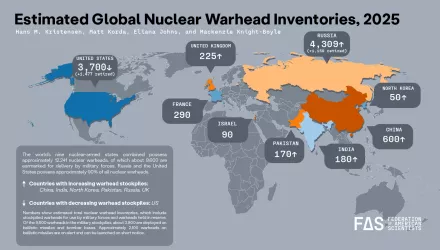"China has numerous serious security concerns about US space weaponization proposals and missile defense plans. These concerns would directly affect China's attitude toward the FMCT negotiations...."
A universal Fissile Material Cut-off Treaty (FMCT), which would ban the production of fissile material (separated plutonium, highly enriched uranium (HEU), and uranium-233) for nuclear weapons, has long been seen as a key building block in nuclear disarmament and non-proliferation. In 1993, the United Nations General Assembly adopted a resolution calling for the negotiation of a non-discriminatory, multilateral, and internationally and effectively verifiable treaty banning the production of fissile materials for nuclear weapons or other nuclear explosive devices.
In March 1995, the Conference on Disarmament (CD) decided to adopt Ambassador Shannon's report and to establish an Ad HocCommittee to begin negotiations on an FMCT. After several years delay caused by debates over the scope of the discussion and the linkage to nuclear disarmament measures, the CD agreed in August 1998 to convene an Ad Hoc Committee to negotiate an FMCT. However, the negotiations quickly ended when the CD failed to agree on renewing the committee's mandate. The 2000 Review Conference for the nuclear Non-Proliferation Treaty (NPT) called for FMCT negotiations to start immediately and to be completed in five years. However, until now, the CD remains deadlocked over the resumption of negotiations, due to recent US plans on missile defense and space weaponization.
To view full text please click here (login may be required).
Zhang, Hui. “FMCT and PAROS: A Chinese Perspective.” INESAP Bulletin, August 2002




